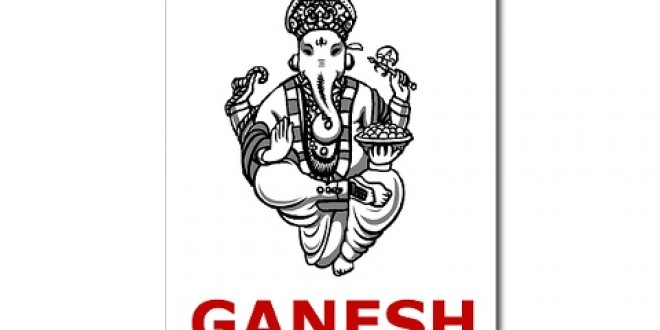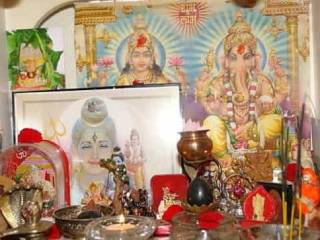Kartik Shuklapaksha 12, Kaliyug Varsha 5115
 |
As a child, I moved around frequently. My parents emigrated from India to the U.S. when I wasn’t even five years old, and we moved from place to place. It seems that I’ve perpetually been stuck with the “New Kid Syndrome” for most of my life.
Unfortunately for me, the schools I attended weren’t ever very religiously diverse. Christians usually made up the vast majority of my peers. It was quite lonely for a little Hindu child like me not having anyone or anything to relate to. Ah, but then there was always Social Studies – my favorite subject. No matter what book we learned from, India was mentioned. As the second most populated country in the world – it had to be. Finally, something I could relate to! With the mention of India always came mention of Hinduism, the religion my family practiced. I always looked forward talking about Hinduism in school because I was almost always the only Hindu around, which instantly made me exotic and the center of attention.
“Wow, cool! There are all these cool-looking gods and goddesses with so many heads and arms! You really believe in all of them?” kids would ask me.
Hey, wait a second, there’s not really more than one God. And why are Shiva, Vishnu, Saraswati, and Lakshmi being referred to as ‘gods’ and ‘goddesses?’ The Bhagavad-Gita is mythology? Like Greek mythology? This doesn’t sound right…
This was an experience I dealt with many years ago, and interestingly enough many Hindus are still dealing with today: the misrepresentation and subsequent belittlement of Hinduism. For a religion as established and tolerant as Hinduism, it is disrespected in the West through other outlets than just public education. Through media and marketable fashions and trends, the face of Hinduism becomes no more than what is represented by many in the West, a “mythological,” pagan religion.
The first issue to address is the fact that many in the West, including scholars, refer to Hinduism as “mythology.” This is by far one of the most insulting descriptions to characterize the religion with. By describing Hinduism as mythology, one suggests that Hindu beliefs are simply a collection of folklore and tales, too fantastic to be real. In reality, all religions are theoretically mythological because no one religion can prove its validity. Can Christians prove that the word of The Bible comes directly from God? Can theyprove that the world was created in seven days? No, but even so Christianity’s core beliefs are rarely described as myths. Rather, they are referred to as “teachings of Christ.” Why then refer to Hindu beliefs as myths and not just what they are also – beliefs? Perhaps in a part of the world where monotheistic religions rule, it is difficult to see truth in a religion with so many faces of God. It is simply easier to cast it off as a sensational belief system. Many don’t regard how insulting it is to Hindus to be told they believe in something that’s, frankly, false. We’re not asking for special treatment or a pretty, little pedestal, but it would be nice if we could stop with the mythology nonsense.
There’s also the issue of referring to the deities as “gods” and “goddesses” rather than “Gods” and “Goddesses”. Again, because the West is dominated by monotheistic religions, it seems nonsensical to give a respectful title to many forms that claim to be “God.” Major religions such as Christianity, Judaism, and Islam prevail in numbers of worshippers and they give claim to only one God. Although Hindus believe in one supreme entity, most don’t understand how there can be so many forms and therefore, they must be referred to as less important “gods.” What most don’t realize is that this is truly disrespectful to Hindus to have Shiva or Ganesh or Krishna referred to as a lowly god, when they serve as core representations of their faith.
As a journalist, I often refer to my AP Stylebook, as many editors require their reporters to follow guidelines set by the Associated Press. Unfortunately for me and other Hindu writers out there, it requires that we refer to these deities in lowercase form. Although because AP Style instructs to “lowercase godsand goddesses in references to the deities of polytheistic religions,” and Hinduism is not polytheistic, as many people assume, but actually polymorphic, I technically could capitalize “God” and “Goddess” when referring to any of the Hindu deities. I doubt, though, an editor would side with me on a technicality he believes to be minor. Of course – therein lies the problem – it is a minor technicality to those outside the religion and the exact opposite to those within.
Former AP reporter and current religion reporter for the San Antonio Express-News, Abe Levy says the rules probably won’t change because numbers usually rule, and the numbers unfortunately don’t lie with Hindus in the West, and he’s probably right (although even he makes the mistake of calling Hinduism polytheistic).
“I think the honest truth is that monotheistic faiths – the world’s largest three of Islam, Judaism and Christianity — share this belief in one God and so until polytheistic faiths in the U.S. break out of their minority status numerically and politically, it won’t change. Is that fair? No. It’s more of a pragmatic solution given the sheer numbers of Muslims, Jews and Christians and their stamp on U.S. history and culture.”
Some say ignorance is bliss – but I have to disagree (at least when it comes to religion). The problem with ignorance is that it usually leads to misconception, and that is definitely not bliss. Misconceptions in the hands of scholars and educators are just plain dangerous. Incorrect and misleading information about Hinduism has often been printed in textbooks and reference books. Public education is a powerful source of information, especially for young people learning about world religions for the first time. What happens when a Hindu child goes to school and reads, “Durga and Kali are terrible and extremely bloodthirsty forms of this goddess,” in a textbook like “The Ancient South Asian World” printed by the Oxford University Press? What about learning that The Mahabharata, an ancient Hindu scripture is described as being, “…like adventure movies of today [that tell] thrilling stories about great heroes” as described in Glencoe-McGraw Hill’s “Discovering Our Past – Ancient Civilizations” textbook? These are certainly not accurate statements about Hinduism, and what’s worse is that they are superficial. Jesus’ crucifixion is never referred to as a “gripping, emotional roller coaster” so why precede the description of a Hindu script with such an introduction? Furthermore, describing Durga and Kali with such adjectives as “terrible” and “bloodthirsty” paints vivid pictures in impressionable minds of demons and monsters like those right out of fairytales. Of course it’s understandable that Hindus and non-Hindus, alike, assume that Hinduism is a pagan religion when scholars describe important figures as elaborate, animalistic idols. Monsters can’t be worshipped as God, so the very idea of Hindu teaching seems ridiculous.
Dictionary.com’s description of Krishna is as “one of the most popular gods…[who is] worshipped in several forms [such as] as the divine cowherd whose erotic exploits, esp. with his favorite, Radha, have produced both romantic and religious literature.” The relationship between Krishna and Radha is one of pure, eternal love as described by Hindu scriptures, and to reduce it to an “erotic exploit” conveys it as simply a sexual relationship, in which Krishna is the hunk who gets all the girls. This description reduces a major form of God to human form, and worse, shows him in an especially bad light by making him sound like a flirt.
Jasneshwari Dev, a spiritual teacher at Barsana Dham Temple in Austin, Texas has written letters to book publishers and conveyed the Hindu community’s disappointment in such wrongful descriptions in hopes to promote better education of Westerners about Hinduism. She says the description of Krishna is completely inappropriate and misleading.
“Using the word “erotic” to describe the love between Radha and Krishna shows the ignorance of the writer. God’s love is beyond the conception of the human mind. But Hinduism does teach us that God is beyond all such human emotions of lust, anger, greed, jealously. The use of this word to describe God is highly offensive to Hindus.”
It’s interesting the fascination people have with fantasy and things that seem non-human and unrealistic. Hinduism again falls into this superficial category and over the years, it has become increasingly “cool” (and profitable) to use colorful images of Hindu figures and symbols on anything from T-shirts and home furnishings to even costumes and restaurant advertisements. Most have no idea what any of these images represent, but again the obsession with things that seem unreal prevails. And if it makes a product sell, then by all means go for it, right? Sadly, many would say “yes.”
This past summer in Spain, fast food giant Burger King revealed a new ad campaign depicting an image of Lakshmi sitting on a hamburger. The caption underneath translated to “This snack is sacred.” The image was used to increase Burger King’s profits and many Hindus saw it as sacrilege. It seemed to be a mockery and a sarcastic pun at the fact that most know that Hindus don’t eat beef.
Last year supermodel Heidi Klum, known for her extravagant Halloween parties, dressed to impress – in a Kali costume. While it was a very colorful and elaborate costume, it’s despicable that she would choose, once again, a very sacred figure to dress up as. How would Christians feel if someone showed up with an expensive costume depicting the Virgin Mary – or worse – Jesus Christ? Maybe it wouldn’t bother many, but what if the culprit were the last person in the world that should to be representing a pious, pure Mary or a humble, selfless Jesus? No one wants others badly representing something they hold dear, and Hindus are no different. Not to say Heidi Klum is a bad person, but she’s not even Hindu and who knows what kind of frolicking went on at her party?
Cafepress.com has a variety of fashions available with Hindu connotations to them, including a couple with the images of Ganesh and Shiva reading “Ganesh/Shiva is my Om Boy” playing off the popular slang term “homeboy” referring to a good friend. It’s funny and it’s cool looking, but I doubt most of the people wearing those shirts have any spiritual relationship with either God to lay claim to the phrase. But of course, that doesn’t matter most of the time.
Some might say these things aren’t big deals because many don’t mean any blatant disrespect, but what they don’t realize is the sheer disregard this shows for Hinduism as a religion deserving of respect. Small things have big impacts. Tolerance is stressed heavily in the West, but maybe empathy and education should be stressed more. Knowledge opens doors and it could be the key for Hinduism finally to receive more respect as the ancient, established, and welcoming religion it really is.
Senior and officer of The University of Texas’s chapter of The Hindu Students Council, Atul Agrawal says he believes that he sees hope for the future, but it will take dedication on the parts of many Hindus and non-Hindus, alike, to make a real difference of how Hinduism is viewed in the West.
“I believe the key thing to removing ignorance is subtlety. For example, yoga has hugely impacted Americans for health reasons. While many people do not divulge into where it originated or the deeper meaning, there are others who do. While the goal is to educate everyone, it has to be one step at a time.”
Source : Brown Girl

 Mizoram: EC accepts Christians’ demand to defer counting on Sunday, but what if Hindus had made a similar demand?
Mizoram: EC accepts Christians’ demand to defer counting on Sunday, but what if Hindus had made a similar demand? Sign Petition : Immediately repeal the draconian and unconstitutional ‘The Waqf Act, 1995’
Sign Petition : Immediately repeal the draconian and unconstitutional ‘The Waqf Act, 1995’ Shriram : Sri Lanka’s saviour
Shriram : Sri Lanka’s saviour Why it is so cool to malign Hindu gods and goddesses, but it may not be that easy now
Why it is so cool to malign Hindu gods and goddesses, but it may not be that easy now Shocking Truth of Taj Mahal exposed by Late Pujya P. N. Oak
Shocking Truth of Taj Mahal exposed by Late Pujya P. N. Oak How are Hindus treated in states where they are in a minority?
How are Hindus treated in states where they are in a minority?